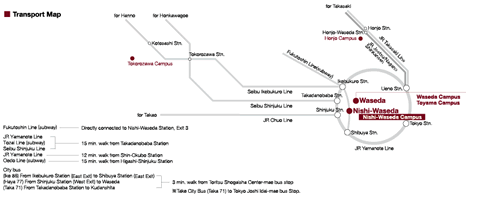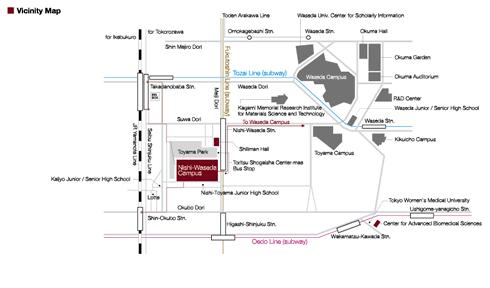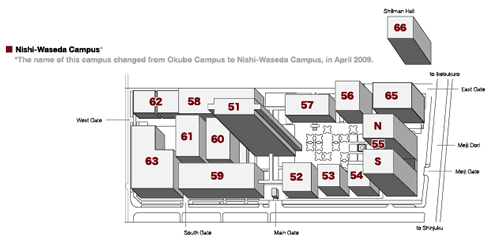Graduate School of Advanced Science and Engineering
Waseda University
Waseda University
Waseda University was established in 1882. It is the leading private university in Japan. It is ranked 4th in the world in the number of CEOs of global companies. The number of international students of Waseda University is the largest in Japan. The students enjoy the university infrastructure supporting their study and stay.
Faculty of Science and Engineering
Faculty of Science and Engineering consists of 3 schools/graduate schools with total of 17 departments. The schools are Fundamental Science and Engineering, Creative Science and Engineering and Advanced Science and Engineering. Approximately 7500 undergraduate, 2600 graduate students and 600 full time professors/assistants stay at the Nishi-Waseda campus in the heart of metropolitan Tokyo.
Cooperative Major in Nuclear Energy
Waseda university has long history of successful researches of radiation and accelerator applications for more than 30 years at Research Institute for Science and Engineering. Based on the achievements, Cooperative Major in Nuclear Energy was started in April 2010 for meeting the needs of raising human resources for "Nuclear Renaissance".
The classroom lectures are shared with the professors of Tokyo City University (formerly Musashi Institute of Technology) that operates Atomic Energy Research Laboratory and Department of Nuclear Safety (undergraduate course). The classroom lectures are taught in Japanese. Capacities of graduate students of CMNE are 15/year for the master course and 4/year for PhD course for each university. The entrance examinations are held separately. The students belong to the university that admits to enter. The thesis study is conducted at the labs of the university. The master course students have to take at least 10 credits of the partner university classroom lectures.
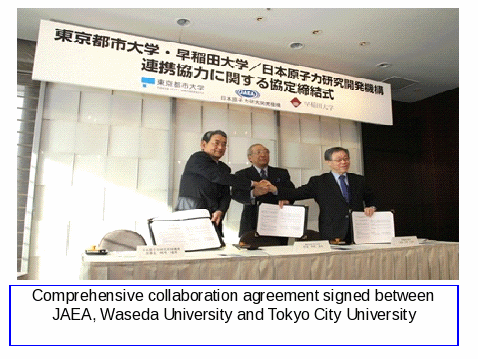
PhD study at Cooperative Major in Nuclear Energy
Professors of CMNE, Waseda University
Akifumi Yamaji: http://www.f.waseda.jp/akifumi.yamaji/home_e.html
- Research subjects: Advanced reactor design, core physics, nuclear safety, computational physics, fuel performance modeling
- Department Head
- Also in charge of Department of Applied Physics
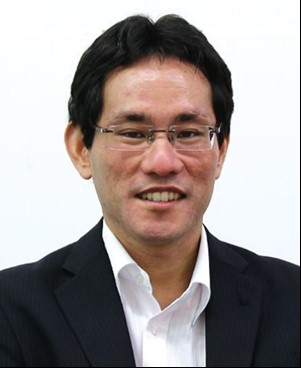
Masahiro Furuya: http://www.aoni.waseda.jp/furuya/
- Research subjects: Reactor thermal hydraulics, heat transfer, reactor safety, measurements of heat transfer
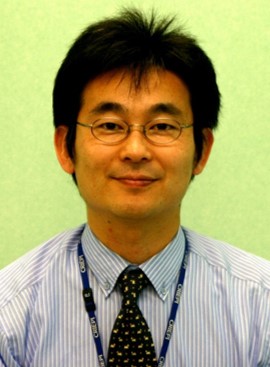
Shinichi Morooka: http://www.f.waseda.jp/morooka/english.html
- Research subjects: Reactor thermal hydraulics, heat transfer, reactor safety, next generation reactors, measurements of heat transfer
- Also in charge of Major in Modern Mechanical Engineering
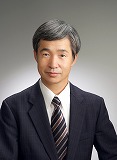
Masakazu Washio: http://www.f.waseda.jp/washiom/top-e.html
- Research subjects: Accelerator science, radiation physics, radiation chemistry, radiation engineering;
- Also in charge of Department of Applied Physics,
- Associate Director of Research Institute of Science and Engineering
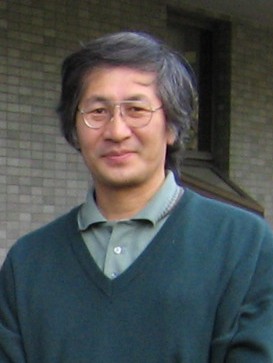
Yoshimichi Ohki: http://www.f.waseda.jp/yohki/top_en.html
- Research subjects: Electrical insulating materials, dielectrics, ion engineering;
- Also in charge of Dept. of Electrical Engineering and Bioscience
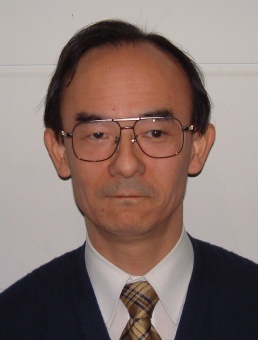
PhD program of Nuclear Engineering at Waseda University
The PhD program was established in 2010 with the goal of training students primarily for leading academic and research positions in nuclear engineering. Students are only required to complete his/her doctoral dissertation. No additional coursework is necessary if they have a prior graduate degree (Masterfs degree). The PhD program gives instruction and guidance for PhD studies in English. Neither proficiency in Japanese nor any training/education is required in the program. You will find overseas postdoctorals and assistants in their laboratories.
The features of the program are:- Focus on the major research areas of nuclear power reactors and radiation/accelerator applications.
- Researches leading the world, such as SCWR (Supercritical-Pressure Light Water-Cooled Reactor), Generation-IV reactors, high-quality beam science, etc.
- International networks and collaborations; We entertain a lively network of research connections with universities abroad through international collaborations, offering students the possibility to develop their own international networks. The professors are serving as a guest professor and an invited professor of overseas universities and research institutes. Their graduates and postdoctoral researchers are working in the world. International video-conference systems are equipped to reach a global audience.
- Collaboration with nuclear industries and research institutes: Nuclear power plant (NPP) is the biggest man-made product. It is the Japanese companies that developed advanced technologies for the design, construction and maintenance and constructed NPP on schedule. We perform the PhD program in close collaboration with the Japanese industries and research institutes.
- Research instruction and education based on the advanced nuclear technologies.; We published the new nuclear engineering textbooks of gNuclear Engineering Textbook Seriesh by Ohm-sha from 2008 (English version will be published from Elsevier.), gSuper Light Water Reactors and Super Fast Reactorsh by Springer in 2010, and gAdvances in Light Water Reactor Technologiesh by Springer in 2010, etc. Students will experience the advanced nuclear technologies in their studies and researches with an insight into the gNuclear Renaissanceh.
We welcome excellent overseas students and encourage you to win scholarships from your country. Please find the application information on special scholarship programs such as the CSC (Chinese Scholarship Council) scholarship.
Please refer to the home pages of the professors.
- Yamaji-laboratory: http://www.f.waseda.jp/akifumi.yamaji/home_e.html
- Furuya-laboratory: http://www.aoni.waseda.jp/furuya/
- Morooka-laboratory: http://www.f.waseda.jp/morooka/engphd.html
- Washio-laboratory: http://www.f.waseda.jp/washiom/top-e.html
- Ohki-laboratory: http://www.f.waseda.jp/yohki/top_en.html
Admission information
Admission information for international students.
https://www.waseda.jp/fsci/en/admissions_gs/Please contact the professor before you apply.
If you have questions of the entrance examination and the application procedure etc, please contact with the graduate admission office of Center for Science and Engineering, Waseda University, gyoumu@sci.waseda.ac.jp
Master course study of Nuclear Engineering at Waseda University
All class room lectures of CMNE are given in Japanese. Proficiency in Japanese is required to enter the master course of CMNE. International students who do not have Japanese language skills can apply to Department Applied physics (Prof. Oka and Prof. Washio), Department of Modern Mechanical Engineering (Prof. Morooka) and Department of Electrical Engineering and Bioscience (Prof. Ohki) for master course study. The departments and the Faculty of Science and Engineering offer some classroom lectures in English. The students can take the credits from the lectures for the masterfs degree. The instructions of the research for masterfs thesis will be given in English. The students of Oka and Morooka laboratories will need the knowledge of nuclear engineering for carrying out the researches of nuclear reactors. They are advised to have mastered fundamental nuclear engineering at undergraduate study. But the research subjects such as computational physics and thermal hydraulics of the labs will not require the learning of nuclear engineering before entering the master course.
